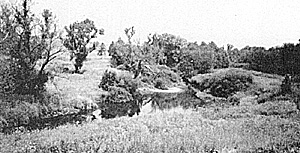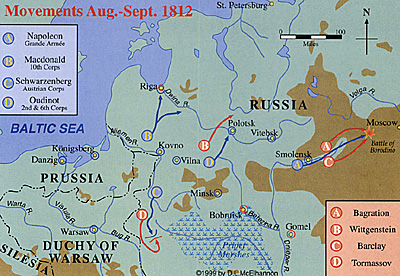The Russian Campaign Begins
Anticipating war with Napoleon, Tsar Alexander made peace with the Turks in May 1812. Russia would not have to fight a two-front war again as it did in 1807. After this shrewd diplomatic move, Alexander then blundered when he assumed personal command of the Russian forces assembled near the borders.
The 35-year-old Tsar's military talents were minimal. At Austerlitz seven years earlier (1805), Alexander ignored the advice of General Kutuzov and the Russians suffered their worst defeat since Narva (1658). His intention in 1812 was to make a stand at Drissa along the Dvina River and to not allow Napoleon to penetrate deep into Russia. This would have provided the French Emperor with exactly the opportunity he wanted for a decisive battle which could bring the campaign to a quick, victorious conclusion. "Then," as the new book Chronicle of the Russian Tsars notes, "to the relief of his generals, he relinquished command of the army to General Barclay de Tolly and set out for Moscow, where he proved to be very effective in rallying support for the war effort."
With the Tsar gone, the Russians still had serious problems. The primary forces opposing the Grande Armee were split. The 1st Army of the West was under General Barclay de Tolly, the 2nd Army of the West was commanded by General Peter Bagration. 51-year-old Barclay had earned his rank through merit on the battlefield, rising from an ordinary soldier in 1776. Bagration, four years younger than Barclay, was a Russian noble who had distinguished himself serving under Field Marshal Suvorov in 1799 and in each of the campaigns since 1805.
At the outset of the 1812 campaign these two rivals retreated before the French invasion, skillfully and sometimes luckily avoiding the decisive battle that Napoleon sought. Despite the enormous losses Napoleon's army took from the heat and disease as it pursued further into the sparse Russian countryside, the Russian army also suffered from these same conditions, as well as increasing demoralization as it fell back.
One of the myths of the 1812 campaign is that the Russian commanders deliberately and skillfully retreated in order to draw the French army deeper into Russia. The reality was that Barclay and Bagration could not agree on a coherent strategy (Barclay preferring to retreat, Bagration clamoring for a fight). Two months into the campaign these two Russian generals were barely on speaking terms. Barclay's apparently endless retreating came under repeated criticism from the Tsar's advisors.
On 20 August, after the battles of Smolensk and Lubino, which marked yet another narrow Russian escape, Prince Mikhail Kutuzov was appointed supreme commander of the two Russian armies over the lowborn Barclay. Kutuzov, who would turn 67 four days after the battle at Borodino, was an inspirational fatherly figure to the largely peasant Russian soldiers. Despite the boost in morale Kutuzov provided, his tactical abilities would be tested and found wanting at Borodino.
 View of the Kalatsha River south of the Borodino bridge. At the time of the battle, the
Kalatsha was considered a formidable obstacle impassable to most arms. In the distance,
the Raevsky Redoubt is visible.
View of the Kalatsha River south of the Borodino bridge. At the time of the battle, the
Kalatsha was considered a formidable obstacle impassable to most arms. In the distance,
the Raevsky Redoubt is visible.
Worse, on his way from St. Petersburg to take command, he met with General Levin Bennigsen and asked him to return as Kutuzov's chief-of-staff.
Bennigsen, ten years senior to Kutuzov, commanded the main Russian army during the 1807 campaign. He fought the French to a standstill at Eylau in February, which was the closest anyone had come to defeating Napoleon since he became Emperor in 1804. Four months later Bennigsen's army was trapped against a river and destroyed at Friedland which resulted in the Tsar signing the Treaty of Tilsit. Many Russian generals later blamed the high Russian casualties at Borodino caused by their dense formations being well within range of the French artillery - on Bennigsen's meddling (Prussian Colonel Clausewitz, serving with the Russians, faulted fellow Prussian Colonel Carl von Toll, a staff officer who exerted unusual influence over Kutuzov).
The Russians Stand and Fight
Kutuzov was a strong advocate of letting French logistical difficulties, including the soon to arrive Father Winter, stop the invaders. However, defending Moscow became politically - and even spiritually - necessary. Thus, the Russian army finally deployed in one of the few strong positions available, some 130 kilometers west of Moscow, and awaited the Grande Armee.
At last, it appeared that the battle Napoleon had worked so hard to achieve, and pushed the limits of his men and horses to bring about, stood before him. Although nearly his entire staff argued that the army should halt and consolidate at Smolensk for the winter, Napoleon, believing that seizing Moscow meant victory, pushed onward. The Emperor expected and needed a triumph that would rival Austerlitz, Friedland and Wagram in military glory and political impact. He was to be greatly disappointed.

More Battle of Borodino
-
Borodino: Introduction
Borodino: Situation in 1812
Borodino: Invasion
Borodino: Battlefield Park
Borodino: Opposing Plans
Borodino: 1: Shevardino Redoubt
Borodino: 2: Borodino Village
Borodino: 3: Bagration Fleches
Borodino: 4: Utitza Village
Borodino: 5: Semenovskaya
Borodino: 6: Great Redoubt (Raevsky Redoubt)
Borodino: Epilogue for a Draw
Borodino: Travel Tips
Borodino: The First Historians
Borodino: Strengths at Borodino
Borodino: Estimating Battle Losses
Borodino: Museum
Borodino: Order of Battle (Text: fast)
Borodino: Russian Order of Battle (Graphics: extremely slow: 587K)
Borodino: French Order of Battle (Graphics: extremely slow: 639K)
Back to Table of Contents -- Napoleon #14
Back to Napoleon List of Issues
Back to MagWeb Master Magazine List
© Copyright 1999 by Napoleon LLC.
This article appears in MagWeb (Magazine Web) on the Internet World Wide Web.
The full text and graphics from other military history magazines and gaming magazines are available at http://www.magweb.com
Order Napoleon magazine direct